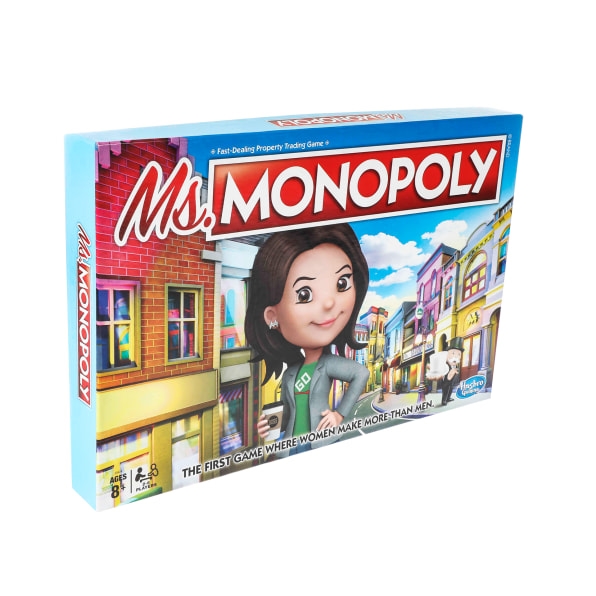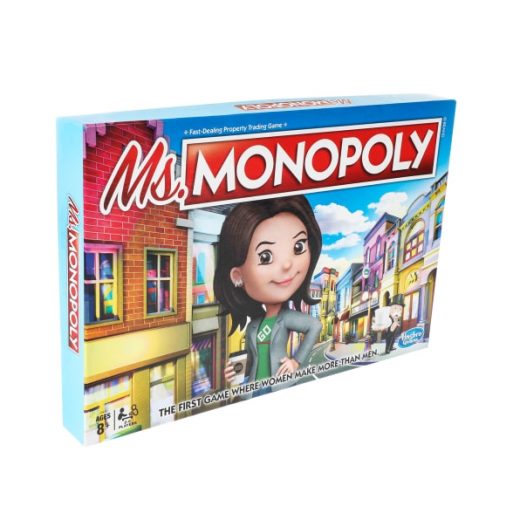‘Ms. Monopoly’ is not as patronizing as Hasbro’s version for millennials, but it’s not empowering either
Every legacy consumer brand faces the same issues: How do you upgrade your products to find meaningful relevance with new generations and be a contender in increasingly crowded markets?
For Monopoly, which is owned by Hasbro, this challenge has become both acute and very public.
Monopoly, which turns 85 next year, has seen many a recent facelift with variations including pop culture plays (Game of Thrones, Toy Story, The Lion King, Dr. Who, etc.) and tongue-in-cheek renditions like the Cheaters Edition—all of which seemed like fairly standard methods to try to rejuvenate the brand.
However, last year, Hasbro shook the table with Monopoly for Millennials, which critics universally bemoaned as an “insulting experience.” The game’s tagline of “Forget real estate. You can’t afford it anyway” seemed to signify that Hasbro was perhaps more interested in wooing back older players (who also like dunking on young adults) rather than genuinely appeal to a new generation discovering the joys of game night. (The reasons why millennials can’t afford homes are varied and complex and have nothing to do with pouring our income into artisanal coffee and avocado toast—xoxo, a millennial.)
Then just last month there was Monopoly for Socialists, another widely panned bit of pandering to older people who might still be afraid of the s-word that the game-centric site Polygon dubbed “horrible, even as a parody.” The release also led to the surely unintended wider dissemination of Monopoly’s roots as a game created by a woman named Elizabeth Magie to spread the message that landlords and real-estate hoarding are societal ills, yet it was appropriated by men and turned into a pro-capitalist pastime.
Now, there’s Hasbro’s latest addition to the Monopoly family: Ms. Monopoly. Its tagline is “The first game where women make more than men.” While it doesn’t seem as patronizing as Monopoly for Millennials or Socialists, it still isn’t a game that’s purely about feminist empowerment rather than exploitation.

In Ms. Monopoly, players invest in inventions and innovations powered by women throughout history instead of properties as in Monopoly. One of the key marketing points for Ms. Monopoly is the fact the girls and women playing the game will make more than the guys: Once female players pass “go” they collect $240 instead of the standard $200 that male players receive. The game also rewards men for supporting women in situations like attending a women’s rally, watching a female-led superhero movie, or writing an article about successful women entrepreneurs. The game even replaces the brand’s famous mustachioed mascot, aka Milburn Pennybags, for a young woman who is apparently his niece.
“When we looked at themes like millennials, it was a fun way to try something new for the brand, and fans loved it. Consumers reacted to it,” says Jen Boswinkel, senior director of global brand strategy and marketing at Hasbro Gaming. “We started looking at all of the things that are happening in the world today, asking, how can we bring new topics to make them relevant and accessible to kids and families? Female empowerment was one of the issues that we all feel so strongly about that we wanted to create a game for it.”
But the question remains: Is Monopoly the proper vehicle for female empowerment?
Spotlighting the women who have helped shape innovation and business is great. But why not make a separate game celebrating that? Monopoly was never a gendered game. Your characters in the game weren’t Cornelius Vanderbilt or Stephen Ross—you were a thimble, a Scottie Dog, a wheelbarrow, and so forth. Women and girls could become real-estate tycoons just like the men and boys.
Ms. Monopoly also once again brings up Monopoly’s own checkered past with women and definitely makes the game side-eye worthy.
In the 1900s, Elizabeth Magie, a writer and activist, filed a patent for The Landlord’s Game, which is acknowledged as the basis for Monopoly, even though the game’s invention is credited to Charles Darrow, who created the derivative that we know today. As well-intentioned as Ms. Monopoly seems, it does feel a bit like a twist of the knife against Magie, who reportedly only made $500 from her invention while Darrow and Parker Brothers reaped a fortune.
The rollout for Ms. Monopoly is trying to put its money where its mouth is by including a grant of $20,580 (in real money) to three teenage girls each who are inventing potentially world-changing tech including devices that can detect sinkholes, lead in water, and harmful dyes in candy and soda. However, even the heartwarming video profiling these young women talking about their creations and receiving a Ms. Monopoly set loaded with cold, hard cash has currently received more than 13,000 dislikes and only 636 likes on YouTube, and the comment section has been disabled. Granted, the bulk of the backlash on YouTube and social media against Ms. Monopoly is just a new outlet for the online misogyny women face every day.
But putting the trolls and Monopoly‘s own past aside for a moment, Ms. Monopoly does ring a little cringeworthy at first blush. Maybe it’s the flashbacks to Bic’s lady pens or the mountain of other products unnecessarily pandering to women, but the idea that a legacy game that was never about gender suddenly has a version with that at its root comes off a bit like cashing in on a cultural wave.
In all fairness, though, the game isn’t even out yet! Boswinkel believes that once people actually play the game and get into its theme, they’ll find a meaningful appreciation for it.
“Everybody’s talking about it, which is great,” she says. “We want to make sure everything that we do resonates. Some people will like it, and some people won’t.”
Fast Company , Read Full Story
(18)


